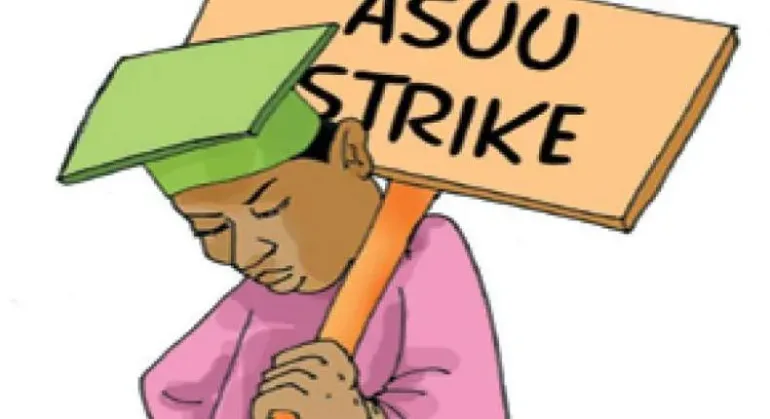The Academic Staff Union of Universities (ASUU) has declared a two-week warning strike, effective Monday, October 13, 2025, following the expiration of an ultimatum issued to the Federal Government over unresolved demands.
The decision was announced on Sunday by the union’s National President, Prof. Chris Piwuna, during a press briefing at the University of Abuja.
The strike action comes amid stalled negotiations between ASUU and the Federal Government, despite recent assurances from the Minister of Education, Dr. Tunji Alausa, that talks were in the final stages.
Speaking last Wednesday, Dr. Alausa stated that the government had made notable progress, including the release of ₦50 billion for Earned Academic Allowances and the inclusion of ₦150 billion in the 2025 budget for university revitalisation. However, ASUU leadership rejected the government’s most recent proposal, citing its failure to adequately address the union’s longstanding demands.
Prof. Piwuna, in his statement, said: “It goes without saying that there is nothing sufficient on the ground to stop the implementation of ASUU-NEC’s resolution to embark on a two-week warning strike at the expiry of the 14-day notice given on 28th September 2025.
Consequently, all branches of ASUU are hereby directed to withdraw their services with effect from midnight on Monday, 13th October. The warning strike shall be total and comprehensive.”
ASUU’s demands include the finalisation and implementation of the renegotiated 2009 FGN-ASUU agreement, release of withheld three-and-a-half months’ salaries, sustainable funding and revitalisation of public universities, and the cessation of alleged victimisation of lecturers at Lagos State University, Kogi State University (now Prince Abubakar Audu University), and the Federal University of Technology, Owerri. The union is also seeking payment of 25 to 35 percent outstanding salary arrears, settlement of over four years’ promotion arrears, and the release of withheld third-party deductions such as cooperative contributions and union check-off dues.
Despite a meeting last Friday where the Federal Government presented a new offer, ASUU leadership rejected it, calling it a “departure from the review of the draft agreement submitted by the Yayale Ahmed committee.”
Prof. Piwuna stated that the union would soon submit its own proposal to the government, pointing out areas of deliberate distortion, inconsistency, and disregard for existing laws and practices. He described the government’s documents as “hurriedly packaged,” “provocative,” and incapable of calming the industrial tension already brewing across campuses.
He further lamented that the Federal Government had previously raised hopes of a resolution before ASUU’s National Executive Council (NEC) meeting in August at Usmanu Danfodio University, Sokoto, by requesting three weeks to address the issues. However, that promise, he said, was not fulfilled.
Government Reacts: Threatens no-work-no-pay policy
In response to the strike, the Federal Government has threatened to enforce the “no-work-no-pay” policy, warning that ASUU’s decision undermines ongoing efforts to restore stability in the tertiary education sector.
In a joint statement issued by the Minister of Education, Dr. Alausa, and the Minister of State for Education, Prof. Suwaiba Ahmad, the government reiterated its commitment to dialogue but insisted it would uphold the law.
According to the statement, the Federal Government has made a comprehensive offer addressing ASUU’s primary concerns, including working conditions, governance, and staff welfare, and is awaiting the union’s official response. The ministers accused ASUU of rejecting efforts at reconciliation and declining to respond to phone calls or proposals aimed at averting the strike.
The statement, signed by the ministry’s spokesperson, Folasade Boriowo, emphasized that while the government continues to demonstrate goodwill and flexibility, it will not abdicate its responsibility to enforce existing laws in the use of public resources.
It reassured students, parents, and the general public that the government remains committed to maintaining industrial harmony in the education sector. The ministers also appealed to all academic unions to embrace partnership and constructive dialogue, adding that the government’s reform agenda is aimed at improving teaching and research conditions, strengthening institutional autonomy, and ensuring productivity in a climate of mutual respect.
The National Association of Nigerian Students (NANS) has expressed concern over the renewed strike and its potential impact on students.
Speaking to The Telegraph, NANS Assistant General Secretary, Adejuwon Emmanuel, said the association is monitoring the situation and has launched mediation efforts. He noted that the NANS President, Olushola Oladoja, has begun high-level consultations aimed at facilitating dialogue between ASUU and the Federal Government to avert a full-blown industrial action.
Adejuwon acknowledged the legitimacy of ASUU’s concerns but appealed to the union to explore alternative methods of engagement that would not further disrupt the academic calendar. He warned that students have already endured excessive setbacks and cannot afford another prolonged strike.
He urged the government to show greater sincerity and urgency in addressing the issues, saying, “The future of Nigerian students must not be sacrificed on the altar of bureaucracy and broken promises.” He added that the students’ body would not stand by silently if academic activities are once again brought to a halt.
Polytechnic lecturers extend ultimatum
In a related development, the Academic Staff Union of Polytechnics (ASUP) has extended its own ultimatum to the Federal Government by six weeks, citing progress in talks with the Ministry of Education.
The union had initially issued a 21-day ultimatum following an emergency NEC meeting on August 15, 2025, to press demands related to salaries, allowances, and institutional governance.
However, following structured engagements with the government, ASUP’s NEC reconvened on October 9, 2025, for its 115th meeting and decided to hold off on immediate strike action. The union cited positive steps taken, including the release of a circular on the Peculiar Academic Allowance by the National Salaries, Incomes and Wages Commission and progress on the 2025 cycle of the NEEDS Assessment intervention for polytechnics.
ASUP also acknowledged the reconstitution of the Federal Government’s renegotiation committee to include the polytechnic sector and the resumption of meetings of the Polytechnics Implementation Monitoring Committee. The union expressed hope that continued engagement will lead to full resolution of outstanding issues.


